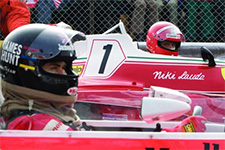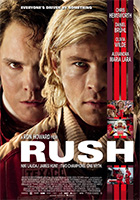Rush
|  One of the best things I can say about Ron Howard’s Rush, which depicts the real-life rivalry between two Formula One racecar drivers during the 1975–76 Grand Prix season, is that my friends who are really into cars and racing absolutely loved it. I don’t have much more than a passing interest in cars—primarily their ability to get me from Point A to Point B—although I do appreciate a powerful engine and beautiful design. However, I couldn’t imagine spending a significant period of time watching them race in circles around a track, so I don’t count myself a fan of the sport, much less an authority. Thankfully, the enjoyment of Howard’s film does not require a deep knowledge or love of racing (although I imagine it would certainly deepen one’s appreciation, hence my friends’ wholesale enthusiasm for the film), only a regard for the inherent dramatics that go along with men who make their livelihood flirting with death. One of the best things I can say about Ron Howard’s Rush, which depicts the real-life rivalry between two Formula One racecar drivers during the 1975–76 Grand Prix season, is that my friends who are really into cars and racing absolutely loved it. I don’t have much more than a passing interest in cars—primarily their ability to get me from Point A to Point B—although I do appreciate a powerful engine and beautiful design. However, I couldn’t imagine spending a significant period of time watching them race in circles around a track, so I don’t count myself a fan of the sport, much less an authority. Thankfully, the enjoyment of Howard’s film does not require a deep knowledge or love of racing (although I imagine it would certainly deepen one’s appreciation, hence my friends’ wholesale enthusiasm for the film), only a regard for the inherent dramatics that go along with men who make their livelihood flirting with death.Taking a break from swinging Thor’s mythical hammer, Chris Hemsworth stars as another kind of superhero, in this case a cocky, handsome, highly sexualized British racecar driver named James Hunt, whose flaxen locks make him a literal golden boy of the racing set, the epitome of the “Live fast, die young, leave a good lookin’ corpse” ethos. Hunt’s party-boy persona contrasts sharply with that of his on-the-track nemesis, a fiercely competitive and highly disciplined Austrian racer named Niki Lauda (German actor Daniel Brühl). Lauda is the kind of man who doesn’t care that people think he looks like a rat because he admires rats’ intelligence and survival instincts, both of which he has in spades. Also like a rat, Niki is not very likeable, which doesn’t bother him in the slightest. To make other people like him would mean focusing on something other than his own success, and he has neither the time nor the inclination. Thus, Rush presents us with two potentially dislikable characters—both self-absorbed, myopic competitors who use and abuse those around them, albeit in dramatically different ways. The handsome and charming Hunt is just out for a good time, reveling in the glory and fame that international racing brings him, while Lauda is consumed with being the best, an aspiration that leaves him with a perpetual scowl (when he smiles, it seems almost unnatural). Hunt throws caution to the wind, merrily recognizing that he could die any day on a hairpin turn, while Lauda calculates the risk of everything and refuses to engage in any race that gives him more than a 30% chance of dying. Hunt sees himself as a kind of chivalric knight, while Lauda is ever the dispassionate pragmatist, telling a fellow driver that he would drop racing in a heartbeat if something else came along at which he was as good and could make as much money. The two men could not be any different, yet as the film progresses we see that their antagonism is laced with a begrudging sense of mutual respect, as each man clearly recognizes that his own lack—Hunt’s inability to be serious and Lauda’s inability to be personable—is precisely what the other embodies. The screenplay by Peter Morgan, who specializes in scripts based on recent history (The Queen, The Last King of Scotland, The Damned United) and collaborated previously with Howard on Frost/Nixon (2008), gives us the background of each character in broad strokes that unfortunately rely on rather self-conscious and out-of-place voice-over narration before focusing the film’s narrative energy on the 1975–76 racing season, when Hunt and Lauda were at their competitive high points. (The film is at its least compelling when it steers into their private lives, depicting courtship and marriage that is doomed in Hunt’s case and inexplicably solid in Lauda’s.) Howard’s initial foray into directing was a Roger Corman-produced juvenile car-crash movie called Grand Theft Auto (1977), which he helmed when he was still thought of, to borrow from a Saturday Night Live skit, “lil’ Opie Cunningham.” He has certainly “grown up” since then, albeit without losing his affinity for both the intensity of racing and the death drive that fuels the racers. Formula One racing was apparently even more dangerous in the ’70s than it is today, as two out of every 25 competitors was expected to die each year in car crashes (Howard shows us the grisly outcome of a crash in which a racer is decapitated by an Armco barrier). At times, it feels like Howard is trying to lay it on too thick, as if the film’s style needs to keep up with the fast, hectic, dangerous pace of the racecar drivers; it’s a variation of the same impulse that led him to muck up the otherwise fantastic fight scenes in Cinderella Man (2004) by intercutting X-ray imagery to show us the damage being done inside the boxers’ bodies. Thus, we get lots of flash cuts, rapid camera moves, extreme close-ups inside roaring engines, and intensely edited montages, often scored to lazily familiar ’70s anthem rock, although he does slow down the proceedings from time to time in order to give us some proximity to the characters, lest they disappear forever into their helmets. Hemsworth and Brühl make Hunt and Lauda into memorable figures, and it is telling that, by the end, I genuinely wanted them to like each other, but still appreciated the fact that they maintained their air of mutual animosity. Copyright ©2013 James Kendrick Thoughts? E-mail James Kendrick All images copyright © Universal Pictures |
Overall Rating: 

 (3)
(3)


